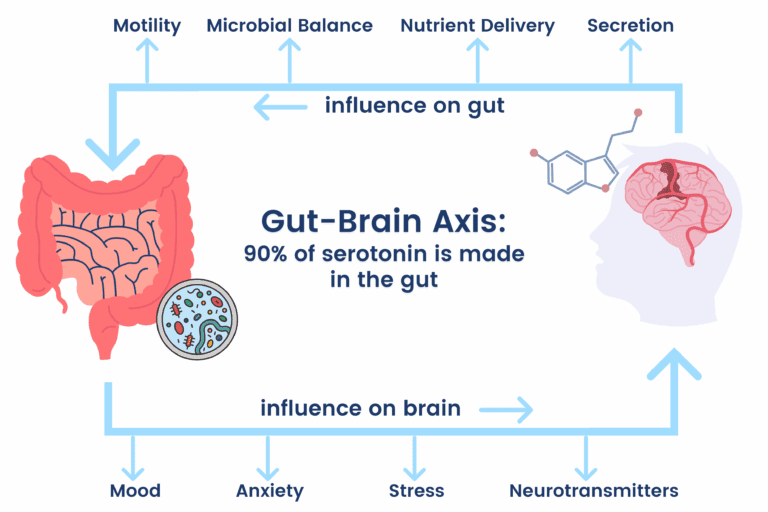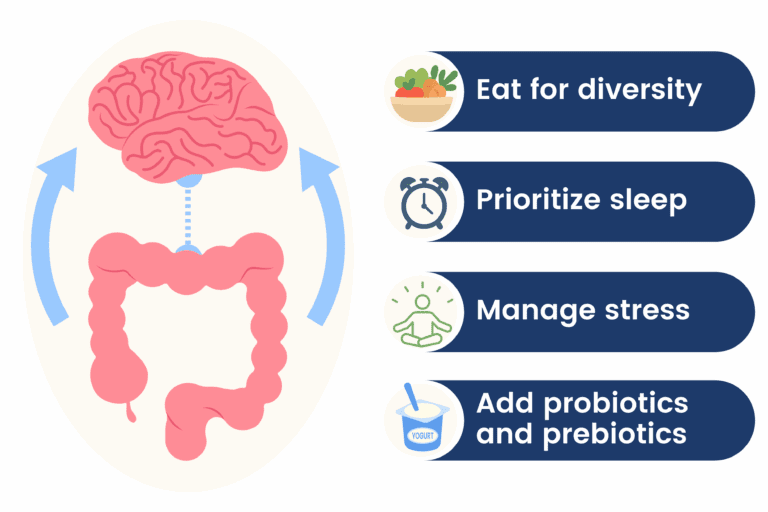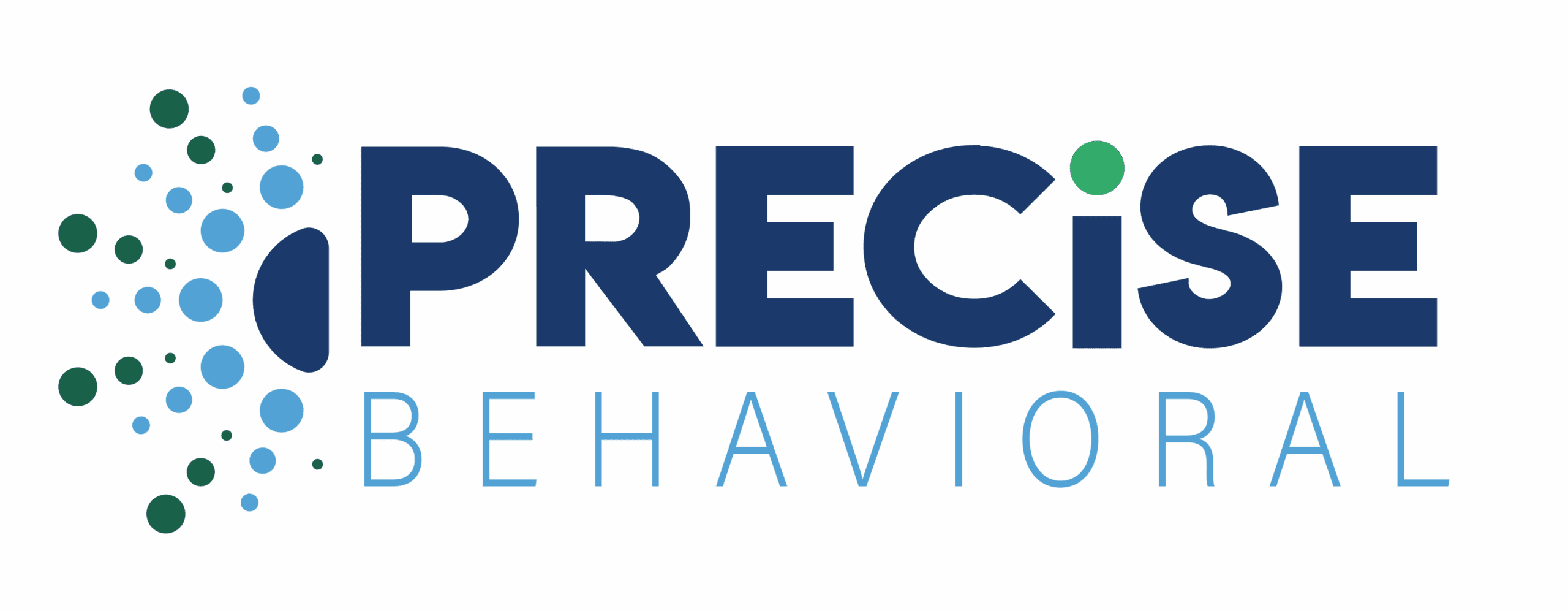Microbiome and Mental Health:
Can Healing Your Gut Heal Your Mind?
Your body is home to trillions of microorganisms, such as bacteria, viruses, and fungi, most of which live in your digestive tract. Far from being harmful, many of these tiny residents help regulate key functions in your body. Together, they form the gut microbiome.
In recent years, research has shown that the microbiome affects more than digestion; it also influences how you think, feel, and respond to stress. At Precise Behavioral, we explore how physical health connects to mental well-being. The gut-brain link is one of the clearest examples of this connection.
Your Gut: More Than Digestion

The gut isn’t just a system for breaking down food, it’s a communication hub. Through what’s known as the gut–brain axis, your digestive tract and brain send signals back and forth via the nervous system, hormones, and immune pathways.
One striking fact: about 90% of the body’s serotonin, a neurotransmitter often called the “feel-good chemical”, is produced in the gut, not the brain (Annamarya Scaccia, 2024). When your gut is balanced, your mood benefits. When it’s disrupted, symptoms like anxiety, sadness, or irritability can rise.
Stress, Anxiety, and the Microbiome
Most people have felt “butterflies” before a big meeting or event. That sensation comes from the gut–brain axis in action, but this connection runs deeper than fleeting nerves.
Recent research continues to highlight just how closely our gut and brain are connected. Here are a few key insights regarding depression and inflammation, probiotics and mood, and finally stress and digestive function:
1. Depression and Inflammation:
One 2023 study in Translational Psychiatry found that people living with depression often had fewer beneficial gut bacteria compared to those without depression. These helpful bacteria normally assist in reducing inflammation, so their absence may contribute to the cycle of both physical and emotional stress (Mingxue Gao, et al., 2023).
2. Probiotics and Mood:
The role of probiotics is also becoming clearer. A 2020 study from The National Center for Biotechnology (NCBI) found that individuals with major depressive disorder who took a probiotic supplement containing Lactobacillus and Bifidobacterium for eight weeks experienced improvements in mood, sleep, and overall well-being, with no side effects (Eleonora Gambaro, et al., 2020).
3. Stress and Digestive Function:
Finally, stress itself can have a direct effect on gut function. A 2023 study published in The Journal of Physiology demonstrated that stress makes the gut more permeable, alters immune and nerve signaling, and slows down digestion. These changes don’t just worsen digestive problems, but they can also feed into broader mental health challenges (Sarah-Jane Leigh, et al., 2023).
In short: stress harms the gut, and a stressed gut makes stress harder to manage. So, what do we do about that?
How to Support Your Gut and Mind

The good news is that the gut microbiome is adaptable, meaning your daily choices can help strengthen it. Research continues to show that simple lifestyle habits can make a big difference for both gut and mental health.
One of the most powerful steps is to eat for diversity. A 2025 study from the National Center for Biotechnology Information (NCBI) found that a varied, fiber-rich diet supports a more diverse gut microbiome. This diversity helps regulate inflammation and produces key neurotransmitters that influence mood and cognition. In other words, nurturing microbial variety may boost resilience against mood disorders and support overall mental well-being (Shradha Patil, et al., 2025).
Probiotics and prebiotics are another essential piece of the puzzle. Fermented foods like yogurt, kefir, and kimchi, as well as prebiotic-rich foods such as oats and bananas, provide fuel for beneficial gut bacteria. A 2025 meta-analysis confirmed that probiotic supplementation can help reduce symptoms of depression, further highlighting the powerful connection between diet and mental health through the gut-brain axis (Atefeh Zandifar, et al., 2025).
Managing stress also plays a critical role. Mind-body practices like mindfulness, deep breathing, and gentle yoga have been shown to reduce inflammation in both the gut and brain. These techniques not only calm the body’s stress response but also improve digestive function and support emotional balance (Michelle Dossett, 2023).
Finally, don’t overlook sleep. A 2025 study published in Elsevier found that even just two nights of poor sleep can reduce gut microbial diversity, potentially weakening mental resilience. Prioritizing consistent sleep routines and creating a restful environment supports gut health, digestion, and mood regulation (Nitu L. Wankhede, et al., 2025).
Taking care of your gut is one powerful way to support your mental health—but it isn’t always easy to stay consistent or know what’s working. Lasting change often requires both daily awareness and professional support. That’s where Precise Behavioral steps in.
How Precise Digital and Precise Clinical Help
Awareness is the first step, but ongoing support is what makes change sustainable. That is why Precise Behavioral offers Precise Digital and Precise Clinical, designed to connect daily life with clinical care.
- Precise Digital is our artificial intelligence (AI) powered mental health platform. Patients engage through interactive tools such as daily journals, mood tracking, and assessments that provide proactive insights and early detection. With natural language processing (NLP) enabled remote patient monitoring, patients receive personalized guidance while providers gain real-time visibility through an advanced dashboard.
- Precise Clinical is our expansive network of psychiatric providers offering both virtual and on-site services. From emergency department consults to outpatient and inpatient psychiatry, our team ensures timely access to the right level of care, reduces costs, and eases provider burnout.
Together, they create a continuous feedback loop: patients gain clarity and support in real time while clinicians guide care with precision and empathy.
Whole-Person Care: Where Science Meets Empathy
Mental health does not exist in isolation. It is shaped by the body, lifestyle, and even the microbes living within us. At Precise Behavioral, we bring these insights into action by blending psychiatric expertise with cutting-edge digital tools.
With Precise Digital and Precise Clinical, patients experience connected support while clinicians use real-time insights to deliver more personalized treatment.
This is the power of whole-person care, where technology, science, and empathy meet to support mental well-being from the inside out.
References:
- Annamarya Scaccia. (2024, July 3). Healthline. Retrieved from Healthline: https://www.healthline.com/health/mental-health/serotonin#:~:text=Bowel%20movements:%20About%2090%25%20of,feelings%2C%20including%20happiness%20and%20anxiety.
- Mingxue Gao, et al. (2023, December 8). Translational Psychiatry. Retrieved from Nature: https://www.nature.com/articles/s41398-023-02670-5#:~:text=Subgroup%20meta%2Danalysis%20showed%20Firmicutes,butyrate%2Dproducing%20genera%20are%20depleted.
- Sarah-Jane Leigh, et al. (2023, September 27). The Journal of Physiology. Retrieved from The Journal of Physiology: https://physoc.onlinelibrary.wiley.com/doi/full/10.1113/JP281951#:~:text=Graphical%20Abstract-,Abstract,of%20stress%20in%20gastrointestinal%20disorders.
- Eleonora Gambaro, et al. (2020, September 10). Frontiers in Psychiatry. Retrieved from National Library of Medicine: https://pmc.ncbi.nlm.nih.gov/articles/PMC7559609/
- Shradha Patil, et al. (2025, July 21). The National Center for Biotechnology Information . Retrieved from The National Center for Biotechnology Information : https://pmc.ncbi.nlm.nih.gov/articles/PMC12366197/#:~:text=Diet%20is%20a%20foundational%20factor,diseases%20%5B30%2C31%5D.
- Atefeh Zandifar, et al. (2025, March 4). The National Center for Biotechnology Information . Retrieved from The National Center for Biotechnology Information : https://pmc.ncbi.nlm.nih.gov/articles/PMC11879892/
- Michelle Dossett. (2023, July 26). Harvard Health Publishing. Retrieved from Harvard Health Publishing: https://www.health.harvard.edu/blog/brain-gut-connection-explains-why-integrative-treatments-can-help-relieve-digestive-ailments-2019041116411#:~:text=Mind%2Dbody%20approaches%20to%20GI,parasympathetic%20response%2C%20and%20decreasing%20inflammation.
- Nitu L. Wankhede, et al. (2025, January 26). Elsevier. Retrieved from ScienceDirect: https://www.sciencedirect.com/science/article/abs/pii/S0306452224006894#:~:text=Sleep%20deprivation%20disturbs%20gut%20microbiota,promise%20in%20restoring%20gut%20balance.
Written by Gabriella Aaron
About the Author
Gabriella Aaron is a Clinical Research Analyst at Precise Behavioral, Inc., with a background in Medical Microbiology and a passion for digital mental health solutions.
Editorial Contributors
This piece was edited by Greta Baker, Mario Baugh, and Kirsten Guiliano.



